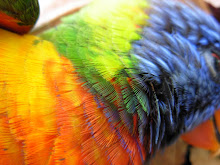Yey naardj?! Reciprocity and the old laws of giving. 20thOct 2008
There is a story about a Noongar called Steel Bullet.
The stories I heard about this old man with eyes - ngorpmin - like blood, who could shape shift wedjabin, yaakinabin an emu or dingo-becoming, concerned a man who it was said had killed the Noongar among him who refused to follow the old ways.
"And what was the old ways?"
I was always told he killed Noongar who refused to share.
Many of the stories I heard about Steel Bullet or Alex Bibarn concerned his meetings with Noongar who did not share their meat with him.
"Dartj ngany-yang" 'meat me-give' he had often been heard to say.
The story always identified with the Noongar protocol that had been broken, that to refuse a Noongar a portion of meat was the very worst of Noongar transgressions...
For my old teacher and his wife their fridge and food was always available, even if this was to leave them short...
It seemed they were unconsciously showing me one of the central tenets/components and social mores of their people, that to refuse another was inexcusable...
But then, I see, by welcoming another to their table or fire they also created an onus and expectation for the other to reciprocate.
"I have done this for you so that you too should do the same for me" I think was how this rule seemed to work.
I have no doubts that this was a significant rule, because I see now how it worked as the social glue that held Noongar networks together.
Reciprocity was the key, a given, that if broken meant that all other relationships were jeopardized.
Steel Bullet's ill-treatment of those whose interpretation of this rule differed to his own reflects how significant the rule of reciprocity was once perceived by the Noongar around him.
His stories were once well-known.
Individualism, a characteristic of present populations has meant that old ways of reciprocity have largely been ignored.
Together with the loss of the Noongar language the break down of reciprocity reflects the dynamic nature of a people struggling with the forces of the dominant society that sits all around them.
It would do all of us a great deal of good, I think, to see the worth of old Noongar ways.
In this generation of financial greed how are our actions any different to the kind of things that put Steel Bullet offside?
We need to return to the old social glue that if we share more the wealth we have amassed with our neighbours, perhaps we will succeed in sharing our stories too.
And perhaps in our sharing of stories, in making time to talk, we might also begin sharing the old language that carried such values of reciprocity: the Noongar mai.
Monday, October 20, 2008
Friday, October 17, 2008
A Better Deal

Yey naartj > now what??
I was reading of a book on Noongar history that will soon be published. And I was thinking about a similar manuscript that myself and members of the Humphries family of Kellerberrin had co-written.
Our book, one of two we have been seeking grants to have structurally edited and published, concerns the Noongar history of the east as told through the stories of the late Cliff Humphries.
Our books titled: "A Kellerberrin Kingfisher" and the other: "Marngart-Menn stories of the eastern Noongar" represent the biography of Cliff Humphries whilst the latter concerns his history and the stories of his people.
The book on Noongar history will be published by a historian who leads a research team within an established Noongar organization.
The problem I have with historians is that for too long they/we have insulated themselves/ourselves from the lives of the people they/we write about.
Their/our claim that they/we represent the interests of a neutral and objective 'history' are rarely challenged. But, I wonder, if they/we have stopped to ever consider, that the stories they/we tell are very often stories that are treasured by someone, even collectively the substance of a family and their community's nourishment.
I am writing more out of fear, I guess, that the said historian will feature material that the Humphries manuscript has delved into and covers.
Perhaps, it could be said, that the other's work will add another slant to the Noongar story. But this particular historian, well-funded by his organisation will have been given the kind of support not available to the rest of us, struggling as we do, to access the kind of grants that historians such as him take for granted.
There needs to be a better deal, I think, for the Noongar deserve that.
The history I have written has been co-authored and critiqued by the Noongar I have worked with.
This history is their story.
Sure Wadjalla historians have never had to consider that stories could be owned by a family.
For the family I work with, who have lived in poverty for much and most of their lives, it is their stories and cultural knowledge that represent the only wealth they carry.
Those who tell their story without informing them, without working with them, negotiating with them, are thieves.
When historians raid the archives, as we do, trolling for details and tracks to the story we'd like to tell, very few of us consider the lives and responsibilities to the people we find there.
The archives are deemed neutral ground, but at some point soon, this will need to change.
Subscribe to:
Comments (Atom)
